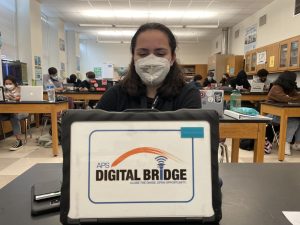Requiring school-issued computers creates level academic playing field
February 7, 2022
Atlanta Public Schools took a necessary stride to provide educational resources to all students and close the digital divide by issuing each student a personal Chromebook at the start of the school year.
However, many students are still being left behind, as others opt to use their personal laptops instead of their school-issued devices. Requiring that all students use their Chromebooks is the next step in ensuring that all students have the same tools needed to succeed in the classroom.
Some teachers have already begun requiring students to bring their Chromebooks instead of their personal laptops in order to prevent cheating. Each Chromebook comes with the software Securly, which allows teachers to monitor students’ activity and confirm that they are on task rather than simply finding the answers online. Teachers will often use the software to monitor students during tests and other assessments, but students who use their own computers do not have this same surveillance. This makes it much easier for those with personal laptops to cheat during these tests, and gives them an unfair academic advantage.
However, whether or not students are required to bring their school-issued Chromebooks should not be an issue that is settled on a teacher-by-teacher or day-by-day basis. This only creates unnecessary difficulties for everyone involved. Students have to keep up with the dates when they need to bring their Chromebook versus when they can bring their personal laptop, and teachers have to resolve issues with students who forget to bring their Chromebook on days when it is required, a regular occurrence that many teachers must deal with.
To alleviate this issue, the school administration should step in and make the use of the Chromebooks a school-wide requirement, easing the confusion of when students need to bring their Chromebooks and following through on the reason behind providing them to all students in the first place.
These school computers are by no means perfect, and some students’ personal laptops may be better suited for certain tasks. For example, some websites, including YouTube, cannot be accessed on the school-issued computers, and some students may have software downloaded to their personal laptops that they do not have access to on their Chromebook. The school should work to provide students with more tools to help them in the classroom, including access to currently restricted resources and software that some students need for certain activities, but they must also ensure that the tools already at students’ disposal are as equal as possible among all students.
Although some students are frustrated with the limitations of the school-issued computers, APS has intentionally placed restrictions and regulations on what students can do on their Chromebooks in order to emphasize security and prevent students from accessing non-educational materials.
If these restrictions are to be imposed equally on all students, and not just those who cannot afford to bypass them by means of their own personal laptop, the school must make sure that all students are using the school-issued computers.
Requiring students to use their school-issued Chromebooks rather than their personal laptops puts every student on a level academic playing field by preventing cheating and giving students equal technological capabilities. While these Chromebooks are beneficial to students who otherwise would not have access to a computer and assist in closing the digital divide, without a school-wide requirement for all students to use them, students who bring in their own personal laptops will continue to be at an unfair and significant academic advantage.











